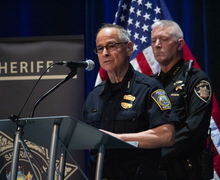Cut loose: GSO to cut from service providers, student organizations to reduce high deficit.
For the 2013-2014 academic year, the Graduate Student Organization expected $465,050 in funds for graduate student services. Instead, what it received was $390,500, about $74,500 less than anticipated.
Now, as a result of this overestimation, GSO will cut more than $80,000 in spending from its budget to try to lower that deficit, said Patrick Neary, GSO’s president.
GSO estimates how much annual revenue it would receive by requesting the amount of graduate students from Enrollment Management and multiplying that by the graduate student activity fee amount, or $40, he said. The mistake came when the GSO comptroller in 2011 failed to specify to the Division of Enrollment Management in the Provost’s Office that they did not count College of Law students and non-matriculated graduate students who do not pay the activity fee. With the error, the GSO counted 900 extra students, believing it had $36,000 more than it actually did for two years in a row, Neary said.
The miscalculation unfortunately coincided with GSO’s high surplus spending at the time, he added. In 2007, when Neary joined GSO, the group had a surplus of $400,000-$500,000, which it decided to spend to benefit graduate students.
“We have been purposely deficit spending for a number of years in order to bring that down,” he said. “Between the two of those, because both of these happened at the same time, there are substantial deficits.”
Because the surplus funds were so large, the organization didn’t realize its error until recently, when the rollover funds went down to about $160,000, Neary said.
As a result of the cuts, GSO is now taking a close look at all service providers and graduate student organizations to see where they can reduce spending. GSO has currently cut $45,300, still leaving $80,000 of debt, he added.
Neary said that in the 2014-2015 academic year he hopes to reduce spending for service providers by $20,000, and the same for graduate student organizations. With 29 student organizations, this would result in about $500-$750 less in funding for each graduate student organization.
He said GSO is making cuts to graduate student organizations to try and force students to spend money more efficiently and frugally. Organizations can save costs by selecting cheaper catering options and only hosting events that would guarantee a high turnout, Neary said.
“We’re looking at stuff where we’re kind of cutting the fat off, and not the muscle,” Neary said. “The ideal here is once we’re done with that, we will be in a position where we won’t have cut into grad student benefits very much, or the grad student experience, we’ll just be more much more efficient at spending grad student money.”
With all graduate student organization events, they are required to go through a preapproval process for their budget, which Pat Dawes, the GSO comptroller, would examine.
The organizations are expected to include details on the budget of the events, how much total funding is requested and what the funds will be spent on, Dawes added.
He said he looks at the budget to make sure any spending is in line with both Syracuse University and GSO’s fiscal policy.
Gabrielle Chapman, the associate dean of the graduate school and GSO’s adviser, said the student organizations were simply refocusing on how they were spending their money, as they do not have a massive surplus to rely on anymore.
“They need to get a good handle on what services they’re providing,” she said.
For the 2013-2014 budget, GSO hasn’t made any further cuts to service providers, as the budget was already approved, so the group made cuts internally this year. The organization intends on cutting the other half from service providers in the 2014-2015 year.
In this year’s budget, GSO already cut $10,000 by cutting services from the Drumlins Country Club and switching to another provider for golf courses. The organization also saved another $12,000 after reducing how much it provided to the Inn Complete from $53,000 to $41,000.
The cut eliminated the South Campus bar’s operations on Mondays, which has not affected its profitability, said Kelly Rodoski, communications manager for SU News Services, in an email.
GSO currently subsidizes the Inn Complete $41,000 a year so that the bar is not shut down, Neary said. He added that the amount will likely be unaffected.
“We give the Inn Complete $41,000 basically because they operate at a $41,000 loss every year,” he said. “We basically make up that difference so that Food Services runs a flat balance sheet. They’re not allowed to run things at a loss, as per the university.”
In return for the subsidies, graduate students are provided cheap beer and a 20 percent food discount.
He said because the Inn Complete runs the risk of shutting down if the amount is lowered, the amount will likely stay the same, despite budget cuts across the board for other service providers.
Dawes, GSO’s comptroller, said he has been examining all nine graduate service providers to see if enough graduate students are using the service to justify its costs. He added that GSO believes the Inn Complete’s subsidy is justified based on how many graduate students use it, but did not specify how many students on average visited the Inn Complete.
One of the service providers being looked at is the Bernice M. Wright laboratory school and the Early Education Child Care Center, which the GSO pays $8,000 and $8,500 to, respectively.
Holley Benjamin, the director of the EECCC, said there are currently eight children in the center whose parents are graduate students. They are there on a cheaper rate than other children because of the GSO’s subsidies, she said.
She added that the GSO’s budget cuts to the day care center would be unfortunate, as its funding is a “substantial part” of the center’s operating.
“It’s supporting the program, it’s supporting the materials we’re providing,” she said. “It would be a huge impact to what we can provide all the children, really.”
Neary said the GSO has spoken with the centers about the budget cuts, and a final decision will be made in March 2014.
He stressed what’s really important is that the GSO considers a service fee increase, which hasn’t happened for nearly eight years. He said he intends on increasing the fee by $4.50, which he believes is a fair amount and would eliminate all future budget cuts. The proposal will happen in the spring of 2014, and would start in 2015 if approved.
“If we have no student fee increase, we have to make another $40,000 to $45,000 cut, and that’s when I see real programming loss,” Neary said. “Things like potentially having to close down the Inn Complete, having to outright eliminate the programming that Career Services in the graduate school do, of having to do massive cuts to student organizations.”
Published on November 12, 2013 at 11:39 pm
Contact Alfred: [email protected]
@alfredwkng




